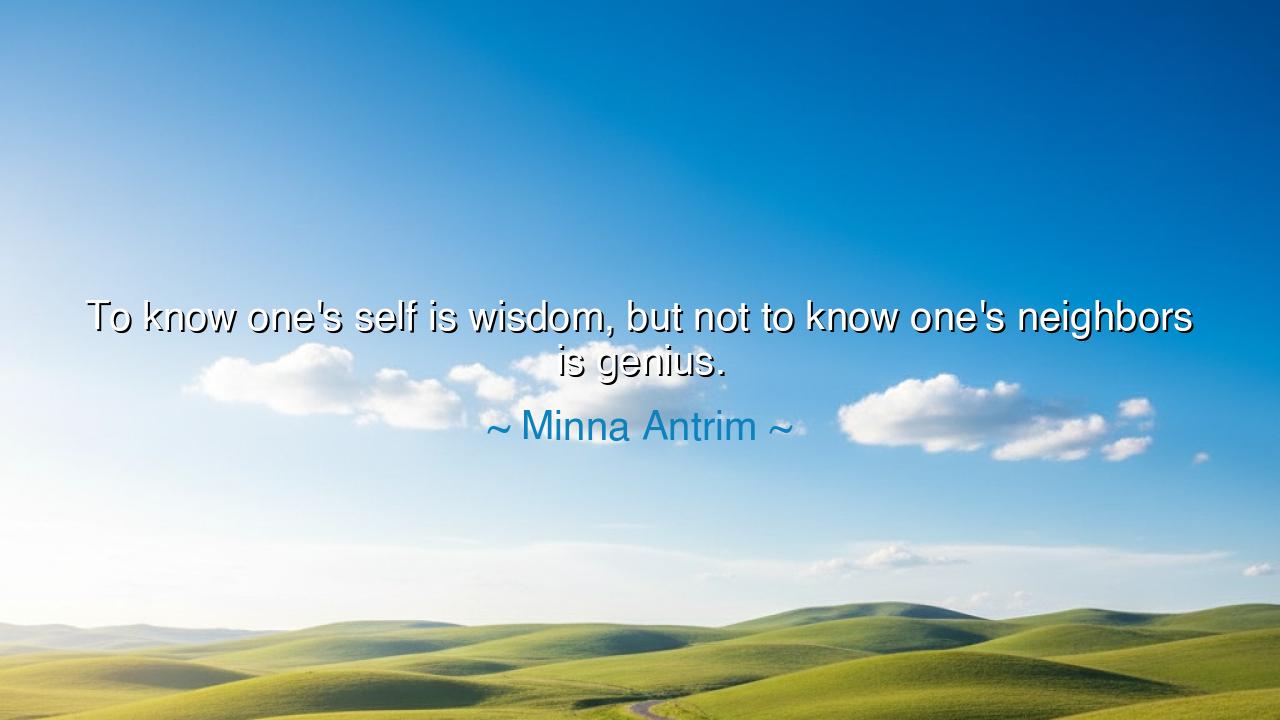
To know one's self is wisdom, but not to know one's neighbors is






Minna Antrim, with her pen dipped in wit and paradox, declared: “To know one’s self is wisdom, but not to know one’s neighbors is genius.” In these words she entwines two truths—one ancient and solemn, the other sly and humorous. For the path of wisdom has ever begun with the command, “Know thyself.” Yet Antrim, in jest that conceals insight, adds that to ignore the follies and gossip of one’s neighbors is a higher art, a mark of rare genius.
The first half of her saying roots itself in timeless teaching. To know one’s self is to look inward with honesty, to perceive one’s strengths and one’s weaknesses, to be neither blinded by pride nor crushed by shame. The ancients inscribed this very maxim at Delphi, teaching that the man who understands his own heart stands closer to truth than the one who surveys the stars. Self-knowledge is the foundation of wisdom, for only he who knows himself can act with clarity and justice.
But Antrim’s jesting addition cuts in another direction. While wisdom is found in self-examination, genius may be found in the ability to rise above the pettiness of others. For how much time is wasted in the chatter of neighbors, in envy, judgment, and idle curiosity! The one who chooses not to dwell on such distractions, who keeps his mind unclouded by the noise of gossip, preserves his energy for greater things. Thus Antrim weds humor with truth: ignorance of trivial matters may sometimes be the truest mark of brilliance.
History illustrates this balance. Consider Leonardo da Vinci, whose mind soared among inventions, art, and philosophy. He was a master at knowing himself, tending his own curiosity and cultivating his own genius. Yet he cared little for the small intrigues of his neighbors. Had he filled his hours with idle talk, his hands would not have painted the Mona Lisa nor sketched the machines that dreamed centuries ahead. His genius lay in minding the vast, while ignoring the trivial.
O children of tomorrow, heed this playful yet profound lesson: seek always to know yourself, for in that lies the beginning of wisdom. But do not squander your spirit in the petty judgments of others, for to turn away from such distractions is to free the soul for greater labors. Remember Antrim’s paradox: wisdom looks inward, genius looks beyond. And in holding to both, you shall walk the path of clarity and the path of greatness.






SH05. thach say ha
At first glance, this quote sounds funny, but underneath the humor is a deeper truth about boundaries and self-focus. Knowing yourself is about reflection; not knowing others might be about avoiding unnecessary complications. Still, I question whether that attitude leads to wisdom or loneliness. Is the quote celebrating independence, or mocking self-centeredness? Perhaps it’s both—a reminder that too much curiosity about others can rob us of peace.
CTNgoc Chau T.G
This feels like a clever jab at human nature. It implies that while self-knowledge is admirable, minding your own business is the real secret to happiness. I relate to that, especially in today’s world where gossip and comparison are everywhere. But part of me wonders—can we really thrive without understanding others? Maybe genius lies not in ignorance, but in choosing wisely when to engage and when to withdraw.
HYKim Thi Hai Yen
I find this quote both humorous and thought-provoking. It suggests that knowing oneself takes effort and honesty, while keeping a distance from others might be a form of self-preservation. But I wonder, is it really ‘genius’ to not know your neighbors, or does that reflect isolation and indifference? Maybe the line between wisdom and detachment is thinner than we think. What do you think Antrim truly meant—sarcasm or sincerity?
HLTran Hoang Long
This quote makes me laugh a little because it feels so witty and slightly cynical. It plays on the idea that self-awareness is noble, but avoiding the drama of others might actually be smarter. I can’t help wondering—does this mean ignorance of others can sometimes bring peace of mind? Maybe it’s a commentary on how meddling in other people’s lives distracts us from our own growth.